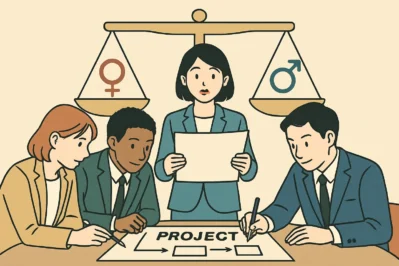Level Up Your Pro Korean: Gender Mainstreaming in Projects
Hello! This is Maeil Hangeul, here to upgrade your Korean to an expert level!
Today, we’re diving into a highly professional and crucial topic in the world of international development: discussing gender mainstreaming strategies. Whether you’re working for an NGO, a government agency, or a multinational corporation, being able to articulate these concepts in Korean will set you apart. Lately in Korea, there’s a growing emphasis on gender equality within its Official Development Assistance (ODA) policies. Mastering this vocabulary isn’t just about learning words; it’s about understanding the core of modern, effective development work and positioning yourself as a competent professional in the field. Let’s get started!
Core Expressions for Development Experts
Here are the essential terms you need to navigate high-level discussions on project management and gender equality.
1. 성 주류화 (Seong Juryuhwa)
* Pronunciation [Romanization]: Seong Ju-ryu-hwa
* English Meaning: Gender Mainstreaming
* Detailed Explanation: This is the cornerstone concept. It refers to the strategy of making women’s as well as men’s concerns and experiences an integral dimension of the design, implementation, monitoring, and evaluation of policies and programs. It’s not just about adding a “women’s component” to a project; it’s about embedding a gender perspective into every single stage to ensure that inequality is not perpetuated. This is a formal, technical term used in official documents and professional meetings.
2. 성인지적 관점 (Seong-inji-jeok Gwanjeom)
* Pronunciation [Romanization]: Seong-in-ji-jeok Gwan-jeom
* English Meaning: Gender-sensitive perspective
* Detailed Explanation: This phrase literally translates to a “gender-recognizing viewpoint.” It means actively considering the different realities, needs, and impacts that a project or policy might have on people of different genders. Adopting a 성인지적 관점 is the practical first step to achieving 성 주류화. It’s about asking, “How will this affect women and men differently?” at every turn.
3. 성과기반관리 (Seong-gwa-giban-gwan-ri)
* Pronunciation [Romanization]: Seong-gwa-gi-ban-gwan-ri
* English Meaning: Results-Based Management (RBM)
* Detailed Explanation: A management strategy used across the development sector, focusing on performance and the achievement of outputs, outcomes, and impacts. When discussing gender, this is critically important. It means you don’t just plan activities; you define and measure specific, gender-disaggregated results. For example, instead of “train 100 farmers,” an RBM approach with a gender perspective would be “increase the income of 50 female-headed farming households by 15%.”
4. 역량 강화 (Yeok-ryang Gang-hwa)
* Pronunciation [Romanization]: Yeok-ryang Gang-hwa
* English Meaning: Capacity Building / Strengthening
* Detailed Explanation: This refers to the process by which individuals and organizations obtain, improve, and retain the skills and knowledge needed to do their jobs competently. In the context of gender mainstreaming, 역량 강화 often involves training local partners, government officials, and community leaders on gender analysis, gender-responsive budgeting, and other related skills.
5. 이해관계자 (I-hae-gwan-gye-ja)
* Pronunciation [Romanization]: I-hae-gwan-gye-ja
* English Meaning: Stakeholder(s)
* Detailed Explanation: This refers to any person, group, or organization that has an interest or concern in a project. For effective gender mainstreaming, it is crucial to identify all 이해관계자 and ensure that marginalized groups, particularly women, have a voice in the project planning and implementation process. This goes beyond consulting only with official leaders.
Example Dialogue: Project Planning Meeting
Let’s see how these terms come to life in a professional setting. Two project managers, A (Min-jun) and B (So-yeon), are discussing a new education project.
A (민준): 이번 신규 교육 사업 기획안을 보니, 초기 단계부터 성 주류화 전략을 보다 체계적으로 통합해야 할 것 같습니다.
(Looking at this new education project proposal, I think we need to more systematically integrate the gender mainstreaming strategy right from the initial stage.)
B (소연): 동의합니다. 특히 현지 조사를 할 때 성인지적 관점을 적용해서, 여학생들의 교육 접근성을 저해하는 실질적인 요인이 무엇인지 파악하는 것이 중요해요.
(I agree. It’s especially important to apply a gender-sensitive perspective during the field research to identify the actual factors hindering female students’ access to education.)
A (민준): 맞습니다. 그리고 성과기반관리 프레임워크에 성별 분리 지표를 명확히 설정해야 합니다. 예를 들어, ‘여학생 중퇴율 감소’ 같은 구체적인 목표가 필요하죠.
(Correct. And we must set clear gender-disaggregated indicators in the Results-Based Management (RBM) framework. For instance, we need specific goals like ‘a reduction in the female student dropout rate.’)
B (소연): 좋은 생각이에요. 이를 위해 현지 교사 및 학부모를 대상으로 한 역량 강화 워크숍을 기획해서, 사업 목표에 대한 공감대를 형성하는 건 어떨까요? 모든 이해관계자의 참여가 필수적이니까요.
(Great idea. To achieve that, how about we plan a capacity-building workshop for local teachers and parents to build consensus on the project goals? The participation of all stakeholders is essential, after all.)
Cultural Tip & Trend Analysis
In contemporary Korea, the concept of ‘성인지 감수성 (seong-inji gamsuseong – gender sensitivity)’ has become a significant topic of public discourse, extending far beyond the development sector. It’s discussed in politics, media, and workplaces. This social atmosphere means that when you use terms like 성인지적 관점 in a professional context, you are tapping into a concept that is highly relevant and understood in modern Korean society.
Furthermore, leading Korean development agencies like KOICA (Korea International Cooperation Agency) have robust gender equality strategies. Their official reports and project documents are filled with the vocabulary we learned today. Being fluent in these terms demonstrates that you are not only proficient in Korean but are also aligned with the current priorities and methodologies of the Korean international development community.
Wrap-up & Practice!
Today, we’ve explored five key professional terms essential for discussing gender mainstreaming in development projects: 성 주류화, 성인지적 관점, 성과기반관리, 역량 강화, and 이해관계자. Using these terms correctly will significantly enhance your professional credibility.
Now, it’s your turn to practice!
Practice Question:
Imagine you are writing a brief project summary. Fill in the blank with the most appropriate term from today’s lesson.
“To ensure the long-term success of our public health project, we will conduct a series of workshops for local healthcare workers. This _________ program will focus on providing them with the skills for gender-sensitive patient care.”
Leave your answer and try creating your own sentence using one of today’s expressions in the comments below! We’d love to see how you use them.






